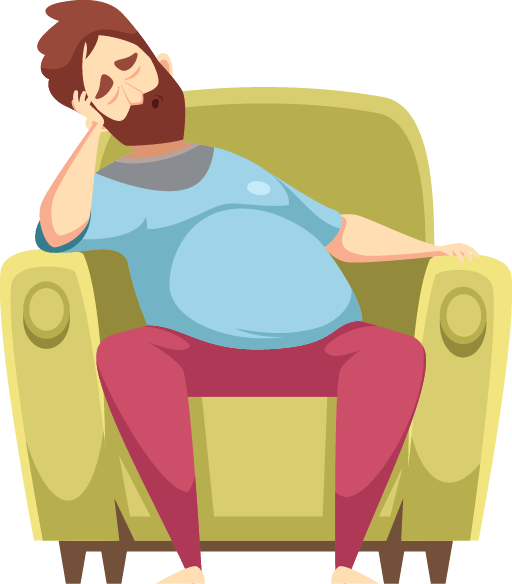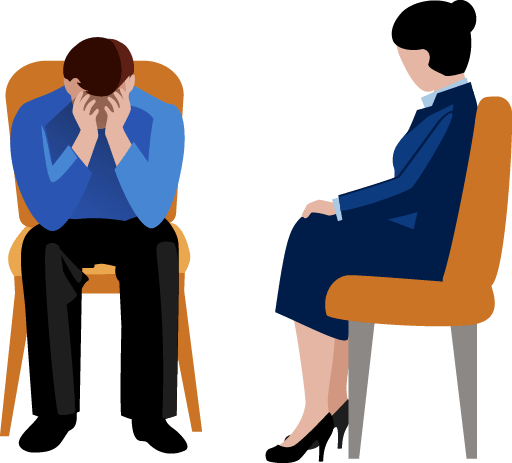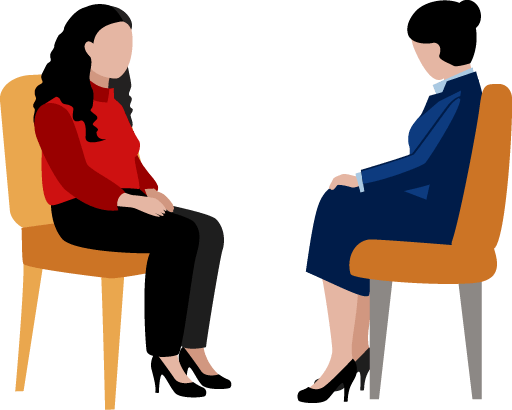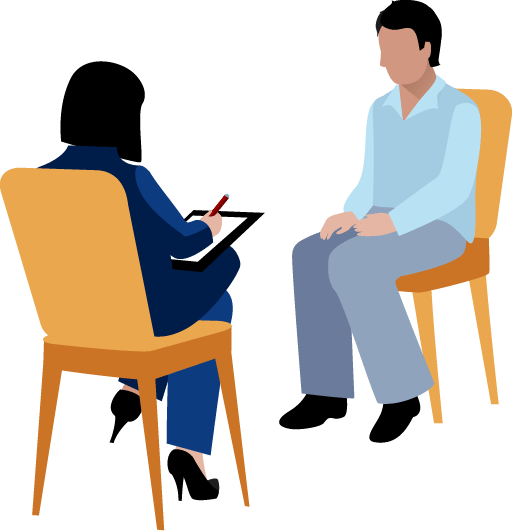
If you are curious about counseling for yourself or a loved one, then this page will guide you in the right direction.
You will learn when it is the “right time” to see a counselor, the difference between a counselor and a friend, how to choose a counselor, and the about the counseling process.
But first, here is our experiences as clients..
In 2004, I (Laura) made a decision that would change my life forever: I went to counseling.
The circumstances behind me going to individual counseling were not ideal, but when are they?
I had come to a crossroads where my life was becoming increasingly dysfunctional because I refused to face some ugly parts of my past. Because of a traumatic experience in my childhood, I had closed myself off from the world, resulting in depression, anxiety and PTSD.
It left me without a future, without hope. When most people my age were getting married and starting their careers, I was floundering at home, hiding from fears that kept me paralyzed and without direction.
I did not make the call to schedule my first appointment, my mother did…

Needless to say, this did not make me the most willing client, but my therapist’s easy-going demeanor and genuine concern peeled back the self-protective layers I had developed over time.
Through counseling, we were able to re-write a traumatic experience in my childhood and put Jesus in the scene. This meant that a terrible moment in time that had capsulized in my mind and body that I had lived over and over again by virtue of post-traumatic stress disorder transformed into a moment where I grew closer to God and came to a better understanding of how Jesus “gets” us because of the suffering He endured.
Maybe you have had a moment in time, or moments, that you can’t get past and they are keeping you from having the life you wish you could have. Or maybe you feel an emptiness that depression brings that prevents you from seeing the good around you.
Perhaps anxiety keeps you so wound up that you don’t know the last time you relaxed.
I’ve been there.

I know what it’s like to be a client and I know what it’s like to be a therapist. As a client I learned to cope with my past, as well as overcome negative thinking and behaviors.
Later, I pursued a degree in counseling because I knew I did not want my life experience to remain silent without helping others. I know that lives can change because mine did.
Watching my wife go through this difficult process was heart-wrenching…
I (Vincent) attended some counseling with her. We struggled through it together. I had some individual counseling as well. I began to learn to love on a deeper level. Through the process, I decided that I wanted to help others as well, especially married couples.
Quick links to individual counseling questions below:
- How do I know if this is the right time to see a counselor?
- Why do I need to see a therapist instead of just talking to a friend or family member?
- How will I know if you’re the right counselor for me?
- How do you help with my depression and anxiety?
- As a Christian counselor, do you pray with us or use scripture?
- What is the first session like?
- How often would I come to counseling?
- How long does counseling last?
- How much does counseling cost?
How Do I Know If This Is The Right Time To See a Counselor?

1.) The quality of your relationships. How are your relationships? If you are struggling in your close relationships (with your spouse, children, or parents), then you would benefit from counseling. If you are having continual arguments or no talking at all, then the relationship is unhealthy, and you need to work on it.

2.) Taking medication for anxiety or depression. If you are already taking medication for anxiety or depression, then you should be seeing a counselor. By taking medication, you have already been diagnosed by a medical professional with a mental health issue. You should be seeing a therapist as well to work on healthy coping skills.
3.) Anxiety attacks or panic attacks. If you are having anxiety attacks, then your body is telling you that you are not handling situations well. You need to change the way that you cope with issues/people.

4.) High blood pressure, overweight, or other long-term health issues. Although we may lie to ourselves about how we are doing, our body does not. Our body always tells the truth. If we do not treat our bodies well, then they will reflect that. If we do not handle stress or difficult situations well, then our body will betray us and tell the truth to how this relationship has affected us (no matter how much we tell ourselves that we are okay.)

5.) Poor functioning at work, home, and social settings. If you are unable to focus and perform your job as you once did, then you may be suffering from depression. Something has got you in a rut, and you need to first identify it and then process it.
Why Do I Need A Therapist Instead Of Just Talking To a Friend Or Family Member?

1.) Confidentiality. A counselor keeps things private. Everything is private with your counselor except for the four exceptions outlined in the “disclosure statement and informed consent” (which are abuse, suicidal or homicidal threat, court order, or client’s request). At CCM, we do not file insurance, and so your information is kept even more private (which means no one will know that you are in counseling unless you tell them or they see you at our office and assume).
2.) Your friend or family member may have a biased point of view. The counselor/client relationship has many boundaries to safeguard unhealthy interferences (to reduce projection and transference.) A friend or family member may react or perceive a situation just like you because they may be triggered or influenced by some outside information or event. They may have conflicting interests or ulterior motives. The counselor will be able to view a situation from a clean slate without interferences from other relationships. The counselor will be more apt to confront uncomfortable issues that friends or family members may steer away from.

3.) A counselor will have more experience and knowledge. Licensed Clinical Mental Health Counselors (LCMHC) not only have four years of undergraduate studies and two years of post-graduate studies, but also have 3000 hours of counseling experience before they are fully licensed. Our counselors have counseled hundreds if not thousands of clients in groups and individually. Counselors also consult with other counselors confidentially – not using the client’s name. Counselors also have to continually learn more about their profession through continuing education. Through a good counselor, you will get the best and most helpful guidance.
How Will I Know If You’re The Right Counselor For Me?
Like every profession, fifty percent of counselors are below average (its just basic math). Make sure you research your counselor before making a decision. Here are some criteria to keep in mind while looking:
1.) You will feel heard and understood. Our goal as a counselor is to first validate and acknowledge a person’s feelings and to understand where they are at in their life. You should get the feeling that you are valued

2.) Your counselor will specialize or have experience counseling in your problem area. Counselors want to work with clients whom they are comfortable treating. Make sure that you fully disclose to your counselor the issues so that they can determine if this is an area that they work with. If the counselor is not comfortable counseling in this are, then they will help you to find the appropriate therapist.
3.) You will like the counselor even though they challenge you. You want someone that you don’t mind spending a lot of time with one on one (because that is what you will be doing in session). You should like your counselor, but that should not be the only factor. You need someone who will lovingly push you in healthy directions.
How Do You Help With My Depression And Anxiety?

Many times, depression and anxiety are co-morbid, or they happen together. In counseling, you will begin to understand your depression.
One definition of depression is “anger turned inward”. We will help you identify your anger and how you turn it on yourself.
Some depression comes from loneliness or isolation from others. Your counselor will help you understand how you have isolated yourself.
We will assist you in identifying unhelpful thinking habits. We will work with you on assertiveness – being able to communicate in your relationships in a healthy, positive way.
Recognizing the Fight/Flight Response…

In counseling, you will begin to better understand your anxiety. We will discuss the fight/flight response and how it manifest itself in your body. Your counselor will demonstrate and role play coping skills to help manage and reduce your anxiety. We will identify faulty thinking that leads to unnecessary stress and anxiety. One strategy is using Cognitive-Behavioral Therapy, where we re-frame situations using more accurate or more realistic information – replacing negative thinking with positive thinking. [I (Vincent) call it “Paulian Therapy”. The apostle Paul says, “…whatever is true, whatever is noble, whatever is right, whatever is pure, whatever is lovely, whatever is admirable – think about such things.” Philippians 4:8]
During session, we use dry-erase boards to write and draw on to better dissect situations and illustrate healthy principles. We also give a lot of hand-outs with more helpful information. In summary, we use talk, role-play, illustrations, writing on the dry-erase board, and hand-outs as a wide variety of ways to communicate during session.
Homework or Goals for Outside of Session
At the end of each session, we help you to come up with homework or small goals that you want accomplish before next session to better your relationships and mental health. Some typical homework assignments are journalling, meditation, prayer, being assertive, read a certain book, or joining a small group. Homework is not always difficult per se – it may be as simple as “have fun” or “go to a movie with a friend”. The homework is really dependent upon the client and the goals that they want to reach in counseling.
As a Christian Counselor, Do You Pray With Us Or Use Scripture?

First of all, everything that we do will be scriptural or christian-based. As Christians, we believe that we bring Christ’s presence into the counseling session whether the client is a Christian or not (Galatians 2:20). Our goal is to allow Christ to work through us, our jars of clay (2 Corinthians 4:7). With that being said, we pray for all of our clients – but outside of session only and not with our clients. The reason that we do not pray with clients in session is that the act of praying with them may be a trigger for them. Our role as a counselor is to be an emotionally safe place for the client.
For some clients, the act of praying may be perceived as manipulative or spiritually abusive. For example, a client’s father may have been the pastor or deacon in a church who would pray with his family in one instance and criticize, put-down, curse, or beat his family in another. This client would have perceived their father’s prayers as a way to control his family and keep them from confronting or exposing his abusive behavior.
As we mentioned above, all of our counseling is scriptural based. We do not always use scripture in session. We are especially sensitive to those who have experienced spiritual abuse or who are not believers.
For client’s who are comfortable with scripture, we may use it more often than not. For dissecting and interrupting a passage of scripture, we always encourage the client to do some expositing of it themselves and to consult their pastor (1 Thessalonians 5:21).
What Is The First Session Like?
Please visit What To Expect On Your First Visit page.
How Often Would I Come To Counseling?

This really depends upon the client and what their goals are. Client sessions are tailor-made – each client is different. However, the average client attends one session per week in the beginning. At the end of each session, the counselor will discuss with the client when their next appointment will be.
Many factors are taken into consideration: client goals, client’s emotional state, availability, client’s support system, finances, etc. If they are going through a crisis, then more than one session in a week may be scheduled.
Over time, the client sessions are spread out more going from weekly to every other week, to monthly, etc.
How Long Does Counseling Last?
Each counseling session is 50 minutes long. Sometimes, clients schedule two sessions back to back which is 100 minutes long.
How Much Does Counseling Cost?
Each 50 minute session cost $125.
CALL 704-658-0238 TO SCHEDULE YOUR APPOINTMENT TODAY!
